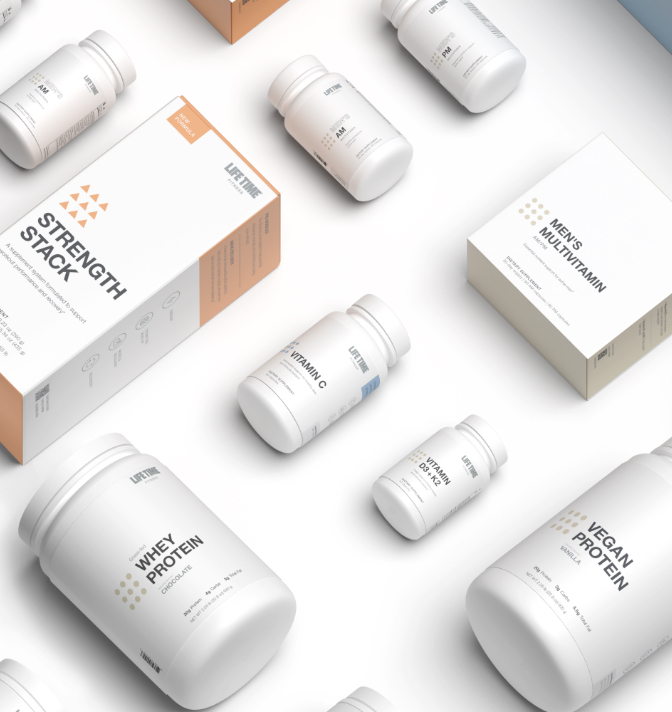Good health always has been — and always will be — important.
Human beings are inherently resilient and can endure an incredible range of environmental and biological conditions with tremendous adaptability — that is, if we provide our bodies with the nutrients they need to build and maintain the integrity of our physical and biological systems.
The basic foundation of healthy cells, tissues, and organ systems are amino acids (from protein) and long-chain fatty acids (such as the essential omega-3 and omega-6 fatty acids). These building blocks, along with other essential micronutrients (including vitamins and minerals), help our bodies resist and respond to changes or threats in our environment — such as physical demands, pathogens, poisons, etc. — so we can grow, thrive, and reproduce.
Consuming a nutrient-dense, wholesome diet of minimally processed foods is the best way to get the macro- and micronutrients our bodies need to make all of this magic happen. For example, the cells and tissues of our immune system can only be optimized through a holistic lifestyle approach that includes adequate physical exercise, sleep, stress management, and a nutrient-dense diet. (Read more about this in “The Ultimate Guide to Supporting Your Immune System.”)
The problem isn’t that whole foods — including vegetables, fruit, and quality protein — aren’t available in our world today. Rather, it’s that much of the food on supermarket shelves consists of highly processed ingredients that have been stripped of many of the most helpful, health-promoting nutrients.
As a result, most of us need to do more than simply eat what’s widely available at the supermarket. We need to make concerted efforts to upgrade the quality of our diets and augment these efforts with a smart supplement plan.
The Role of Supplements in Immune Health
Supplements are concentrated sources of nutrients that can otherwise be consumed from whole foods. Unlike eating the nutrients through food, though, the nutrients or bioactive compounds found in supplements may exert more concentrated, therapeutic effects than can be practically achieved solely through food. (Note: Contrary to popular myth, the Food and Drug Administration (FDA) does regulate dietary supplements, albeit differently than food, cosmetics, or pharmaceutical drugs.)
Dietary supplements are not meant to make up for unhealthy eating habits or be used as replacements for medical treatments. They’re exactly what the name suggests: supplementary.
There is an abundance of published clinical research on the roles of nutritional and botanical supplements in the prevention and complementary treatment of several acute and chronic health conditions. For example, acute respiratory tract infections (which can be a result of a poor functioning immune system) claim more than 2.5 million lives annually; nutritional status is known to play a role in supporting immune health.
A recent pre-print review concluded that supplementation with several nutrients can be safe, effective, and low-cost strategies to support optimal immune function. Researchers noted that supplementation above the Recommended Dietary Allowance (RDA) for certain nutrients is warranted and often necessary for best outcomes.
The following review of supplements is intended to outline general evidence and promising research related to common infectious illnesses that have been researched with well-designed studies. As always, consult with your medical provider before making significant changes to your supplement regimen, especially if you feel sick, are taking prescription medications, or are managing any chronic health conditions.
Daily Supplements
Some dietary supplements are recommended as long-term, daily use products to promote essential nutrient adequacy on a lasting basis, regardless of how healthy someone’s diet is.
There are a few supplement categories or types we believe are necessary for a daily foundation of good health, especially for those who exercise regularly or live demanding lifestyles. At Life Time, we refer to them as “The Foundational Five,” and they include high-quality multivitamins, omega-3 fish oil, vitamin D, magnesium, and/or digestive enzymes.
High-Quality Multivitamin
Micronutrients, or vitamins and minerals, are integral to the immune system, and the body needs consistent and adequate levels of all of them for effective immune function.
Micronutrients are necessary to help us maintain healthy mucus membranes, which reduce the chances of pathogens causing infection, and to help us build immune cells that attack and kill invading bacteria and viruses that happen to get into our bodies. These nutrients also help us repair healthy cells once the illness is over.
Vitamins A, D, C, E and zinc are required to promote structural and functional integrity of skin and mucus membranes, which form physical and chemical barriers against invading pathogens.
If a pathogen gets past these barriers, cell-mediated immune activity kicks in. This relies on adequate levels of vitamins A, D, C, E, B6, B12, folate, iron, zinc, copper, selenium, and magnesium. Cell-mediated immune activity is a natural ability to create inflammation that makes it more difficult for pathogens to proliferate within the body.
The production, differentiation, movement, and function of immune cells that allow for a healthy inflammatory response to neutralize invading bacteria or viruses is regulated by vitamins A, C, D, E, B6, iron, zinc, and copper.
Even subclinical deficiencies of various nutrients can have adverse effects on immune-system function; evidence also suggests various other environmental factors — such as poor air quality — can further diminish immune resilience in the context of borderline nutrient status.
Accumulating evidence suggests that intakes of several nutrients in amounts greater than the established RDAs may be required to help optimize or maximize immune function and improve resistance to infection. So even if you consume a nutrient-dense diet, it is still wise to supplement with a high-quality multivitamin.
Despite how common multivitamins are, there are not many clinical trials investigating their use for immune support. It’s more common to see well-designed studies on one or a few individual micronutrients relative to immune-system function.
However, a one-year randomized, double-blind, placebo-controlled study of independently living adults over age 65 showed a multivitamin/multi-mineral supplement had several beneficial effects on immune-system function. Compared to those receiving a placebo, the group taking multivitamins experienced fewer nutritional deficiencies, reduced frequency of illness, fewer infection-related illness days during the one-year study period (23 versus 48 days), and fewer days taking antibiotics. They also showed greater immune response, as measured by natural-killer cell activity, lymphocyte response, and IL-2 production.
A more recent and similar 12-week study showed that subjects who received a multivitamin and mineral supplement had improved nutrient status for vitamin C and zinc during the study period. Those taking the multivitamin supplement also reported lower incidence and shorter duration of illnesses such as colds and flu. The authors concluded that multivitamin supplementation improves immune outcomes in older adults.
The likely effective dose: At least 100 percent of the RDA for all micronutrients, but higher amounts of several nutrients may be needed for optimal immune function.
Omega-3 EPA and DHA from Fish Oil
EPA and DHA omega-3s are critical for healthy cell-membrane function and managing a healthy inflammatory response to injury or infection.
Omega-3s support healthy immune function through so many mechanisms that it’s tough to cover them all here. To name a few:
- EPA and DHA omega-3s are important structural components of the cell membranes of all cell types, including all the different types of immune cells.
- Omega-3s actively regulate the production and release of inflammatory cytokines and macrophages as part of the early immune response to pathogens, helping the body attack foreign cells while avoiding excessive damage to healthy tissues.
- Omega-3 fatty acids and their metabolites help control the production and transport of neutrophils (a type of white blood cell), as well as phagocytic activity (the process of immune cells engulfing bacteria and viruses).
- EPA and DHA help regulate the production and activation of T-cells and B-lymphocytes as part of our adaptive immune response; they also appear to help increase the number of antibody- producing cells — specifically IgM antibodies — necessary for early antibody response.
- Omega-3s might have direct effects on other types of immune cells, such as dendritic cells, natural-killer cells, mast cells, basophils, and eosinophils.
In totality, omega-3s seem to be critical for proper immune-system function and inflammation modulation in response to infectious pathogens.
It’s important to note that inflammation is a necessary part of the immune process; it contains and combats the bacteria or virus that caused the infection. Excess inflammation, however, seems to worsen acute respiratory symptoms and increase the risk of long-term complications or tissue damage in respiratory infections, specifically.
The omega-3s from fish oil play critical roles in both a healthy inflammatory and immune response, as well as the post-infection restoration of healthy tissue function.
Some large research reviews have shown EPA and DHA omega-3 supplementation is involved in better outcomes in those with chronic or acute infectious lung conditions. A 2018 meta-analysis that looked into 40 randomized, controlled trials of omega-3s in Acute Respiratory Distress (ARDS) cases concluded that mortality rates in patients receiving omega-3s were half that of patients not receiving omega-3s as part of their treatment. Evidence from a smaller review was less clear.
Recent research in mice showed that signaling molecules derived from EPA and DHA omega-3s were able to speed up the resolution of lung inflammation following pneumonia infection.
Perhaps most encouraging is research showing that EPA and DHA confer benefits to those with cystic fibrosis, one of the most debilitating chronic lung conditions that affects mucus characteristics and gas exchange in the lungs.
Additional clinical research is underway to investigate other immune-inflammatory modulating effects of fish-oil supplements (along with vitamin D) as a cost-effective, preventive treatment to reduce the incidence and severity of various lung conditions, including pneumonia, COPD, and asthma.
The likely effective dose: 2,400mg of total EPA + DHA per day. More may be needed based on omega-6 fatty acid consumption. (Read more: The Omega Balance.)
Vitamin D
Vitamin D is a fat-soluble vitamin and hormone precursor that our body can produce when exposed to adequate amounts of UVB radiation from sunlight. It has several important roles for overall health, including supporting bone and cardiovascular health, testosterone, and immune function.
Regarding immune function, vitamin D supports innate immunity by inducing antimicrobial proteins that help reduce the chance of virus or bacteria infecting our cells; it is also involved in adaptive (cell-mediated) immunity by supporting a healthy inflammation response.
Evidence suggests adequate vitamin D helps defend against viruses entering cells in the respiratory tract and helps protectively regulate the inflammatory immune response if lung tissue is infected, slowing the spread to other cells.
As little as 20 minutes of midday sun exposure of the face, hands, and arms without protective sunscreen may be enough to maintain healthy vitamin D levels, depending on the time of year, latitude, and individual skin-pigmentation characteristics.
Those living in northern latitudes (north of Atlanta, Ga., for example) or those with darker skin pigmentation may require more UVB exposure to maintain adequate vitamin-D levels.
Dietary vitamin D can be consumed from fatty fish, beef liver, egg yolks, or a number of fortified foods, although it is almost impossible to achieve optimal vitamin D levels solely through diet.
More than half the world’s population is deficient in vitamin D, and up to 80 percent of the United States population may have levels below optimal (greater than 40 ng/ml).
One randomized trial investigating the effect of supplementing with 5,000IU (125mcg) of vitamin D3 per day for 14 weeks in athletes showed those getting vitamin D3 increased production and secretion of antimicrobial peptides and proteins, which help reduce susceptibility to upper respiratory infections.
A 2017 meta-analysis of vitamin-D supplementation for prevention of acute respiratory infections concluded vitamin-D supplementation is not only safe, but it also protects against acute respiratory tract infections. Subjects who were most deficient and those who were taking daily vitamin-D doses several times higher than the RDAs seemed to benefit the most.
Some researchers argue that earlier evidence of positive effects of vitamin-D supplementation on other viral illnesses, such as influenza, suggest it could help reduce risk of COVID-19 infection and death. The argument has enough strength and promise that clinical trials are already underway, despite the COVID-19 outbreak being so recent.
Likely effective dose: 5,000IU (125mcg) daily of vitamin D3 with vitamin K2.
Magnesium
Magnesium is an essential mineral that’s involved in hundreds of metabolic reactions related to our health. Yet many people fail to consistently consume adequate amounts of magnesium in their diets, and several modern lifestyle factors or medications (prescription or over the counter) either increase magnesium requirements, diminish magnesium absorption, and/or cause excess magnesium excretion.
The best food sources of magnesium are pumpkin seeds, leafy green vegetables, beans, legumes, and whole grains.
Regarding immune-system function, magnesium is essential for the development and proliferation of lymphocytes (a form of white blood cell) and supports proper cell-mediated immune response. It also serves anti-inflammatory functions that may be especially helpful during acute illnesses. (Note: There have not been any clinical trials on magnesium for prevention or treatment of COVID-19 specifically.)
Most multivitamin supplements contain insufficient amounts of magnesium because it’s a bulky mineral that takes up a large volume of space in the formula, so it’s often recommended as an additional, standalone supplement.
The likely effective dose: 200 to 300mg one to two times daily.
Digestive Enzymes
A vital part of our innate immunity — chemical and mucus membranes — relies on enzyme activity to intercept and neutralize infectious pathogens. The body produces its own digestive enzymes to facilitate digestion and absorption of food and nutrients.
These enzymes serve as an important line of defense against invading pathogens that may make their way into our bodies through the food we eat.
Our natural enzyme production and activity can be diminished, however, under several common circumstances, including the use of antacids, proton pump inhibitors, or NSAIDs; frequent or prolonged antibiotic use; poor magnesium status; inadequate protein intake or absorption; and chronic stress.
Symptoms of reduced digestive enzyme efficiency included bloating, indigestion, reflux, belching, inconsistent bowel patterns, and undigested food particles in stools.
Supplemental digestive enzymes can be a very beneficial part of overall health and immunity both directly and indirectly: They help neutralize potential pathogens before they pass through protective barriers of the gastrointestinal tract, and support better vitamin and mineral status through improved digestion and absorption of nutrients.
The likely effective dose: This varies by individual, but one to two capsules of a broad-spectrum formula, such as Digestive Enzyme Complex, with each solid food meal may be beneficial.
Additional Immune-Supportive Supplements
Beyond these foundational nutrients and enzymes, there’s plenty of evidence suggesting additional nutrients or botanical ingredients may offer further immune support.
Vitamin C
Vitamin C is a water-soluble essential nutrient we need to consume through diet and/or supplementation. It is important for the structural integrity of our skin and mucus membranes, and is critical for several processes involved in cell-mediated immunity. It may also increase antibody production and help protect against free-radical damage related to inflammation during infections.
Immune cells accumulate vitamin C at levels several times higher than in blood cells. These high concentrations of vitamin C in lymphocytes and neutrophils have been shown to function in two critical ways:
- Vitamin C appears to help the immune cells produce hydrogen peroxide, which denatures the genetic material of the bacteria or virus, preventing replication.
- Vitamin C’s antioxidant capacity protects immune cells from the extreme levels of oxidative stress created when immune cells attack bacteria and viruses.
In theory, it’s relatively easy to meet the RDA for vitamin C (about 60mg/day) by eating bell peppers, citrus fruit, broccoli, berries, and Brussels sprouts. However, cooking these foods can destroy vitamin C and evidence suggests at least 200mg per day may be needed to optimally support the immune system.
Several studies show vitamin C supplementation at doses ranging from 1,000 to 8,000mg per day may help reduce the duration, but not the frequency of, upper respiratory infections. Interestingly, the benefits only appear to be present when the supplements are taken habitually, as opposed to after onset of an illness, and only in people who exercise regularly.
A 2019 meta-analysis found that high-dose oral and intravenous (IV) vitamin C therapy may reduce the length of intensive care unit (ICU) stays and shorten the length of time critically ill patients need to be on ventilator support.
Another recent small trial of IV vitamin C therapy in critically ill patients with ARDS showed that patients receiving high doses of vitamin C intravenously had fewer complications and significantly lower mortality rates.
There’s also ongoing research into high-dose IV vitamin C therapy in COVID-19 patients, though it’s still considered an experimental treatment and is not yet integrated into standard care guidelines.
The likely effective dose: 200mg per day for healthy immune function; 1,000mg up to eight times daily may help reduce the duration of upper respiratory illness.
Probiotics
Probiotic supplements are sources of microorganisms that can shift the microbial balance of our lower intestine. A recent meta-analysis showed that probiotic supplementation reduced the incidence of upper respiratory infections (URIs) by approximately half, shortened URI duration by approximately two days, and reduced antibiotic prescription rates.
The likely effective dose: Researchers are just scratching the surface of understanding which strains of bacteria are most helpful to each individual, so the type and amounts of colony-forming units (CFUs) to look for in a supplement isn’t clear.
Well-researched strains will be indicated on supplement labels with a specific letter-number code after the name of the strain, such as Bifidobacterium bifidum (BI-04), which is a clinically studied strain shown to support healthy immune function (it’s also just one of the strains in Life Time’s Multi-Probiotic).
Zinc
Zinc is a trace mineral essential to overall health, most notably skin health, mucosal-membrane integrity, testosterone production, and the production and differentiation of immune cells.
The top food sources of zinc are oysters, beef, shellfish, pork, baked beans, dark-meat poultry, pumpkin seeds, yogurt, and cashews.
Zinc supplementation is strongly supported by research, especially amongst elderly populations and those with chronic lung conditions such as COPD or cystic fibrosis.
There’s evidence that more than 75mg of zinc from oral lozenges may help stop common cold viruses from replicating in the upper airway when used within 24 hours of the onset of symptoms.
Acute zinc deficiency or insufficiency appears to cause decreased mucus membrane integrity and blunts adaptive immune response, not only making it easier to catch an illness but also harder to mount a healthy immune response once exposed or infected. Chronic zinc deficiency appears to increase inflammation, which could lead to complications from infections that produce a large amount of oxidative stress, such as respiratory infections like COVID-19.
Additional research on zinc lozenges and syrups, which are different than oral pills containing zinc, suggest zinc lozenges may have a role in reducing the replication of the viruses that cause the common cold when used soon after symptoms present.
The likely effective dose: 80-plus mg per day during infection or for wound healing or more than 75mg of zinc from oral lozenges per day to help fight common cold virus replication.
Quercetin
Quercetin is not a vitamin or mineral, but it is a health-promoting organic compound that’s part of the flavonoid family of antioxidants.
Quercetin is found in several plants and herbs and gives many of them a deep, rich color. Apple skins, berries, Brassica vegetables (such as broccoli and kale), grapes, onions, tea leaves, tomatoes, leafy greens, and even nuts and seeds are all good sources of quercetin.
Quercetin supplementation has been studied for more than a dozen different potential therapeutic effects, of which the most promising for humans appear to be help with managing allergies, heart health, and diabetes, helping prevent certain cancers, its anti-inflammatory properties, and promoting immune-system resilience.
The mechanisms by which quercetin may help fight viruses are encouraging. It may help transport zinc into infected cells, similarly to hydroxychlorioqine, which allows zinc to then exert its effects on disrupting viral RNA transcription. It also provides powerful antioxidant support to help minimize damage to healthy cells as the immune system fights infection.
Clinical studies related to immune function have shown that quercetin supplementation — when in addition to diet — may help reduce total sick days and upper respiratory tract infection (URTI) symptom severity, but the effects aren’t always significant for all ages and genders.
The immune-supportive benefits appear to be most pronounced and repeatable in subjects who exercise regularly, helping reduce the incidence of URTI’s.
There are some intriguing in vitro studies that suggest quercetin may have functions that could help resist infection from a few viruses including enterovirus, Ebola virus, and MERS-coronavirus; a recent review concluded that quercetin “displays a broad range of antiviral properties which can intervene at multiple steps of pathogen virulence — virus entry and viral replication.”
Quercetin intake varies based on how much produce you consume, yet it’s not absorbed easily from food sources, so supplementing may be a safe, consistent way to support your antioxidant intake. Quercetin absorption is increased if the supplement is prepared as a phytosome (complexed with a fat source like lecithin). This way, you can take a smaller amount but absorb more of it.
The likely effective dose: 250mg of Quercetin Phytosome twice daily, or 1 gram of non-phytosome twice daily.
N-Acetylcysteine
N-acetylcysteine (NAC) is a precursor to the sulfur-rich amino acid L-Cysteine, a conditionally essential amino acid found naturally in many protein- and sulfur-rich foods, such as meat, poultry, egg yolks, broccoli, Brussels sprouts, garlic, oats, onions, and red bell peppers. (Conditionally essential means under certain conditions, we need to consume more L-cysteine from food or supplements beyond what we can make internally to meet our needs).
NAC is not an essential nutrient and it’s not found in nature, so there isn’t an established daily requirement. However, it has several unique functions, some of which relate specifically to lung function and immune response.
NAC may help support the immune system during respiratory illness by helping break up mucus to open airways and by acting as a powerful antioxidant to protect against damage to the delicate tissue of the lungs.
Medically, NAC is used to treat acetaminophen toxicity (overdose of the active ingredient in Tylenol®) and is also used as a mucolytic agent to break up mucus in the airways of patients with cystic fibrosis.
The main role of NAC in non-medical treatments is to promote the production of glutathione, the “master antioxidant,” which is important for our detoxification systems and for combating free radical damage due to inflammation.
In those with chronic, recurring bronchitis, both a systematic review and a meta-analysis of clinical trials suggest NAC may be particularly helpful for reducing the frequency and duration of bronchitis symptoms.
Evidence also suggests regular use of NAC seems to improve lung function in those with chronic obstructive pulmonary disease (COPD).
NAC may also help with other inflammation-related breathing conditions, such as asthma and nasal sinus infections, and it’s even been shown to have protective effects in smokers.
A meta-analysis of NAC’s effects during acute respiratory distress syndrome, which often requires risky and costly hospital management in intensive-care units (ICUs), showed patients treated with NAC had shorter ICU stays than those who were not given NAC. Interestingly, the short-term and 30-day mortality was not different between the two groups, but the duration of ICU stay was significantly shorter in the NAC group.
A November 2020 evidence review in the journal Therapeutics and Clinical Risk Management concluded that NAC’s properties may prove beneficial in the prevention and/or treatment of SARS-CoV-2.
The likely effective dose: 600 to 900mg twice per day (orally).
Taking it All in
While it may be difficult to process all the available information on supplements and immune health, one thing can be clear: Certain high-quality supplements offer considerable benefits to human immune-system function.
Whether you’re just getting started with supplements or are staring into a cabinet full of a hodge-podge of products you purchased at varying points along your health and wellness journey, take a moment to reset your supplement routine starting in the order presented in this guide. (After, of course, consulting with your medical provider if you’re making any significant changes.)
We suggest taking a high-quality multivitamin, getting enough vitamin D and essential omega-3 fatty acids, and optimizing nutrient absorption from food through healthy enzyme function.
Then, consider optimizing your intakes of other immune-supportive supplements and nutrients like those included in Life Time’s new Immune Stack, which includes Vitamin D3 + K2, Multi-Probiotic, Vitamin C, and Zinc + Quercetin.
Sure, there’s investment and effort involved in following a well-designed supplement protocol, but if it helps minimize illness time and costs of treatment, it may just be one of the most important investments you make for yourself.
References
https://www.preprints.org/manuscript/202003.0199/v1
https://www.mdpi.com/2072-6643/12/1/236/htm
http://acpjc.acponline.org/Content/118/2/issue/ACPJC-1993-118-2-034.htm
https://www.mdpi.com/2072-6643/12/8/2447/htm
https://www.ncbi.nlm.nih.gov/pmc/articles/PMC6834330/pdf/ijms-20-05028.pdf
https://www.tandfonline.com/doi/abs/10.1080/07315724.1995.10718468?journalCode=uacn20
https://www.ncbi.nlm.nih.gov/pubmed/29859104
https://www.jimmunol.org/content/jimmunol/196/6/2742.full.pdf
https://www.plefa.com/article/S0952-3278(15)30060-0/pdf
https://grantome.com/grant/NIH/R01-HL101932-03
https://www.ncbi.nlm.nih.gov/pmc/articles/PMC3738984/pdf/nutrients-05-02502.pdf
https://www.tandfonline.com/doi/abs/10.1080/02640414.2015.1033642
https://www.bmj.com/content/bmj/356/bmj.i6583.full.pdf
https://www.mdpi.com/2072-6643/12/4/988/htm
https://clinicaltrials.gov/ct2/show/NCT04334005
https://journals.physiology.org/doi/full/10.1152/physrev.00012.2014
https://www.sciencedirect.com/science/article/pii/B9780128021682000269
https://lpi.oregonstate.edu/mic/health-disease/immunity
https://academic.oup.com/nutritionreviews/article/65/5/181/1822809
https://www.ncbi.nlm.nih.gov/pmc/articles/PMC6521194/
https://jamanetwork.com/journals/jama/fullarticle/2752063
https://clinicaltrials.gov/ct2/show/NCT04334512
https://pubmed.ncbi.nlm.nih.gov/25927096/
https://www.ncbi.nlm.nih.gov/pmc/articles/PMC3636409/pdf/11357_2011_Article_9377.pdf
https://www.sciencedirect.com/science/article/pii/S0954611108000425
https://www.cochranelibrary.com/cdsr/doi/10.1002/14651858.CD001364.pub4/full
https://www.sciencedirect.com/science/article/abs/pii/S1568997214002808
https://www.cochranelibrary.com/cdsr/doi/10.1002/14651858.CD001364.pub4/full
https://www.ncbi.nlm.nih.gov/pmc/articles/PMC4808895/pdf/nutrients-08-00167.pdf
https://www.sciencedirect.com/science/article/abs/pii/S0367326X15300927?via%3Dihub
https://www.ncbi.nlm.nih.gov/pubmed/19516153
https://www.ncbi.nlm.nih.gov/pmc/articles/PMC6069798/
https://www.ncbi.nlm.nih.gov/pmc/articles/PMC4997876/
https://www.ncbi.nlm.nih.gov/pubmed/31436895
https://journals.sagepub.com/doi/full/10.1177/1934578X20976293





